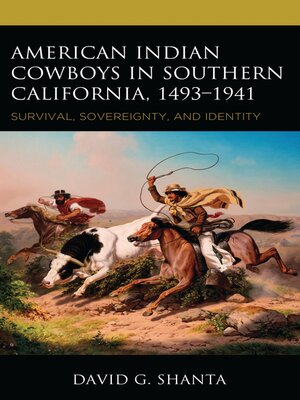American Indian Cowboys in Southern California, 1493–1941
ebook ∣ Survival, Sovereignty, and Identity
By David G. Shanta

Sign up to save your library
With an OverDrive account, you can save your favorite libraries for at-a-glance information about availability. Find out more about OverDrive accounts.
Find this title in Libby, the library reading app by OverDrive.



Search for a digital library with this title
Title found at these libraries:
| Library Name | Distance |
|---|---|
| Loading... |
In 1769–1770, Spanish Catholic missionaries, soldiers, and Cochimí Indians of Baja California launched The Sacred Expedition to Alta California, to claim it for God and King. Domesticated animals like horses and cattle provided food security in the continual expansion of the Spanish empire. The rapidly increasing herds consumed traditional sources of Indigenous foods, medicines, tools, and weapons and soon outstripped the ability of soldiers and priests to control them. This reality forced the Spanish to train trusted Indian converts in the art of cowboying and cattle ranching. In this book, David G. Shanta provides new insights into the impact of horses and cattle on the Indigenous peoples of the Spanish Borderlands after early colonization. American Indian cowboys formed the backbone of Spanish mission economies, the international trade in cowhides and tallow that created the Mexican ranchero class known as Californios, and later on American cattle operations. Shanta shows that California Native peoples first adopted cowboying and cattle ranching, as a survival strategy. They acquired and ran their own herds, forming a new, California Indian economy based on cattle. This new economy reinforced their demands for sovereignty over their ancestral lands. This book affirms the innovative nature of American Indian Cowboys and brings to light how they survived, gained recognition of their sovereign status, and incorporated cowboying and cattle ranching into family traditions and tribal identities.







